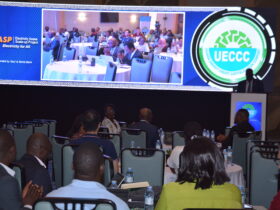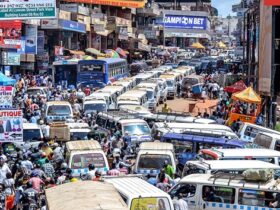More than 150,000 households who are expected to make a shift to clean energy by 2020.
The Swedish embassy in Kampala has donated a Shs 15.5 Billion to a Uganda’s CleanStart programme under the United Nations Capital Development Fund.
The multibillion contribution agreement is meant to set up a Renewable Energy Challenge Fund (RECF) in Uganda and was signed off by Ambassador to Uganda H.E. Per Lindgärde.
“This will make it possible for at least 15 additional enterprises to grow and scale up access to affordable energy for over 150,000 households by 2020,” Mr. Lindgärde said on Thursday.

Sweden is contributing SEK 40,000,000 (UGX 15.5 Billion) towards the Renewable Energy Challenge Fund implemented by UNCDF in Uganda. (Photo: Embassy of Sweden)
By end of 2020, RECF aims to support 150,000 low-income customers transition to renewable energy.
“Today, Sweden is reaffirming its continued support to Uganda’s development in the energy sector. I say “reaffirming” because Sweden has been a partner in Uganda’s energy sector since 1993,” he emphasized.
“Sweden has committed to raise US$ 1 billion over the next 10 years for on and off-grid power projects as our contribution to the Power Africa initiative. We look forward to realising the aspirations of this programme and it’s expected contribution to the energy sector development in Uganda,” he added.
RECF will have challenge rounds in three groups of energy solutions: clean cooking, pico solar power, and large solar power or micro-grids.
Energy access remains a big challenge for Uganda with only 20% of the population having electricity and over 90% of households depending on biomass for cooking. The country’s high population growth rate makes the efforts to increase access to have little impact on the energy access development trends. New demand consistently outstrips supply capacity. The rural areas are the worst affected by the lack of affordable off grid alternatives to meet their energy needs.
Edited by Stephen Muneza Kagabo (Adopted from @SwedeninUG)












